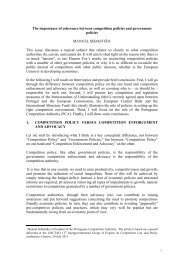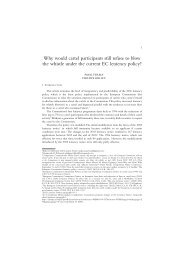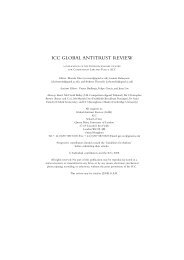GAR 2008 journal [PDF 1354 kb] - The Interdisciplinary Centre for ...
GAR 2008 journal [PDF 1354 kb] - The Interdisciplinary Centre for ...
GAR 2008 journal [PDF 1354 kb] - The Interdisciplinary Centre for ...
You also want an ePaper? Increase the reach of your titles
YUMPU automatically turns print PDFs into web optimized ePapers that Google loves.
16<br />
GLOBAL ANTITRUST REVIEW<br />
In very few cases, constitutions reflect unambiguous frameworks.<strong>The</strong> European Court<br />
of Justice (ECJ) has ‘constitutionalised’ the different European Community (EC) and EU<br />
Treaties and turned the EC into a legal order sui generis, whereas successive Treaty<br />
amendments extended the scale of policy fields and undoubtedly balanced the original<br />
market orientation. A high level of employment and social protection, equality between<br />
men and women, economic and social cohesion and solidarity among Member States<br />
currently 4 rank among the EC’s explicit goals. 5 Those goals have gained significance,<br />
regardless of the fact that they do not necessarily impose specific legally binding obligations.<br />
Community institutions can hardly ignore provisions on environmental protection, 6<br />
employment aspects, 7 cultural interests, 8 public health, 9 consumer protection, 10 or<br />
industrial policy. 11<br />
In the context of the fundamental freedoms, it is widely recognised that a number of<br />
non-market goals such as environmental protection, 12 public health, 13 or the protection of<br />
workers 14 are legitimate objectives, which the Member States may pursue and which may<br />
consequently restrict the free movement, provided the measures adopted meet the<br />
proportionality test. In competition law, Article 86(2) EC provides <strong>for</strong> a justification of<br />
measures adopted in the context of services of general economic interest.Article 87(2) and<br />
(3) EC enable Member States under certain conditions to grant state aid serving a nonmarket<br />
goal.<br />
At a first glance and following a textual interpretation, Article 81 EC seems to be<br />
confined to competition-related aspects, while providing <strong>for</strong> a mere efficiency defence<br />
possibly outweighing restrictions of competition. Nevertheless, the European Commission,<br />
endorsed by the Community Courts, considered the following public policies 15 , noncompetition<br />
goals 16 , public-interest 17 , and non-market goals 18 under different doctrinal<br />
approaches when applying the provision. For the purpose of the present study, a distinction<br />
will be made between competition (-related) and non-competition goals corresponding to the<br />
distinction between market- and non-market goals outside the field of competition law.<br />
4<br />
Changes brought about by the Lisbon Treaty adopted in 2007 (Treaty of Lisbon amending the Treaty on European<br />
Union and the Treaty establishing the European Community, signed at Lisbon, 13 December 2007, O.J. 17.12. 2007,<br />
C 306/01) are mentioned expressly.<br />
In the absence of express references, the version of the Nice Treaty is referred to.<br />
<strong>The</strong> Lisbon Treaty even extends the non-market goals of the Union, see e.g.Articles 1 a EU,Article 2 EU and 2B-2F<br />
and 5 a TFEU.<br />
5<br />
Article 2 EC.<br />
6<br />
Article 6 EC,Article 174 EC f.<br />
7<br />
Article 127(2) EC.<br />
8<br />
Article 151(4) EC.<br />
9<br />
Article 152(1) EC.<br />
10<br />
Article 153(2) EC.<br />
11<br />
Article 157(3) EC.<br />
12<br />
ECJ, C-302/86, 1988 ECR 4607 Commission v Denmark.<br />
13<br />
ECJ, C-41/02, 2004 ECR I-11375 Commission v Netherlands.<br />
14<br />
ECJ, joined cases C-369/96 and C-376/96, 1999 ECR I-8453 Arblade and Others.<br />
15<br />
Monti, 'Article 81 EC and Public Policy', (2002) 39 Common Market Law Review, 1057-1099 (title).<br />
16<br />
See e.g. the terminology relied on by Schweitzer, 'Competition Law and Public Policy: Reconsidering an Uneasy<br />
Relationship.<strong>The</strong> Example of Article 81 EC', EUI working paper, 2007; Quellmalz, 'Die Justiziabilität des Art. 81 (3)<br />
EG und die nichtwettbewerblichen Ziele des EG-Vertrages', (2004) Wettbewerb in Recht und Praxis, 4, 461-470, 461;<br />
Roth, Zur Berücksichtigung nicht wettbewerblicher Ziele im Europäischen Kartellrecht - eine Skizze, in: Engel and<br />
Möschel (ed.), Recht und Spontane Ordnung, Baden-Baden, 2006, 411-435; Komninos, 'Non-competition concerns:<br />
Resolution of Conflicts in the Integrated Article 81 EC', University of Ox<strong>for</strong>d, <strong>Centre</strong> <strong>for</strong> Competition Law and<br />
Policy', L 08/ 2005, available at http://denning.law.ox.ac.uk/lawvle/users/ezrachia/CCLP%20L%<strong>2008</strong>-05.pdf (last<br />
visited on 20th April <strong>2008</strong>).<br />
17<br />
Komninos, 'Non-competition concerns: Resolution of Conflicts in the Integrated Article 81 EC', University of<br />
Ox<strong>for</strong>d, <strong>Centre</strong> <strong>for</strong> Competition Law and Policy', L 08/ 2005, available at<br />
http://denning.law.ox.ac.uk/lawvle/users/ezrachia/CCLP%20L%<strong>2008</strong>-05.pdf (last visited on 20th April <strong>2008</strong>), 6.<br />
18<br />
Regarding the internal market: De Witte, Non-market values in internal market legislation, in: Shuibhne (ed.),<br />
Regulating the Internal Market, Edward Elgar, 2006, 61-86, 63.


![GAR 2008 journal [PDF 1354 kb] - The Interdisciplinary Centre for ...](https://img.yumpu.com/36860029/26/500x640/gar-2008-journal-pdf-1354-kb-the-interdisciplinary-centre-for-.jpg)

![GAR 2009 journal [PDF 592kb] - The Interdisciplinary Centre for ...](https://img.yumpu.com/43872044/1/184x260/gar-2009-journal-pdf-592kb-the-interdisciplinary-centre-for-.jpg?quality=85)
![Law, markets and globalization (David J Gerber) [PDF 371kb] - The ...](https://img.yumpu.com/35387890/1/184x260/law-markets-and-globalization-david-j-gerber-pdf-371kb-the-.jpg?quality=85)

